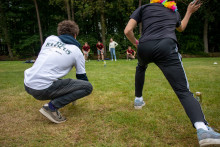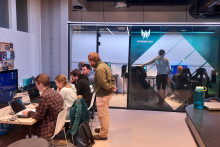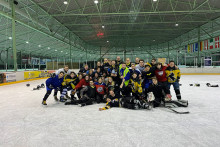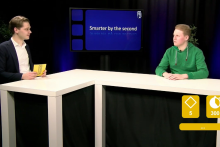De Klocus is living proof that the corona crisis was indeed capable of producing something beautiful, says board member Ivo de Vries and student Advanced Technology. ‘It may not have been a planned corona child, but it was created by the circumstances of the moment. Four housemates came up with the idea, based on the thought: if the pubs are closed and sports are not allowed, then we will bring the sport and pub to the people.’
‘Klonkieball’, the game De Klocus created, is a Twente variant of the well-known drinking game Flunkyball. The rules of that game: two teams line up on opposite sides of a rectangular field, with a bottle filled with water in the middle. All players have a bottle of beer in front of them and take turns throwing a ball at the bottle in the middle. When the bottle is knocked over, the other teams must put the bottle upright as fast as possible and return to their own side. Meanwhile, the team that knocked over the water bottle tries to drink their bottle of beer as quickly as possible, in the time it takes the other team to put the bottle upright and return. The winner – you guessed it – is the team that empties their respective beer bottles first.
A shoe and a can of Klok
Klonkieball however, differs in two important aspects. Firstly, Klonkieball players do not throw with a ball, but with a shoe, overhand by the way. According to the still-young legend, in the early days of the association, a Klocus member had forgotten to bring a ball, and a shoe turned out to be the most obvious throwing object. Where the average ball sports association has their own ball house, De Klocus has its own collection of playing shoes.
The second aspect may be the most important. Drinking a bottle of beer of any one brand is against the mores. A game of Klonkieball is played with a 50-centilitre can from De Klok: a cheap pilsener brewed by Grolsch, which has a cult status among students. ‘The real enthusiast drinks it at room temperature, of course,’ says De Vries. ‘Of, as the saying goes, a true gladiator drinks it from the radiator.’
Alcohol policy
Although many Klocus members play the game with a can of Klok and the association has incorporated the beer into its own name, according to De Vries it is not about the beer. ‘I can imagine that it seems a bit contradictory. But the focus is not on getting drunk, it is on being together and having fun. Within the student culture, this means that beer is a part of it for several people. But if you want to drink something other than beer, that is fine too. We have many members for whom this is the case. This is also stated in our alcohol policy: in line with the alcohol policy of the UT, playing the game with non-alcoholic drinks is the standard. I dare say that less beer is drunk at De Klocus than at the average sports association on campus.’
Ford Klocus
Although De Klocus is less than two years old, it is a fully-fledged association with more than 150 members, statutes, (competition) regulations, a monthly training and activities, a Student Union recognition, and committees, such as the Ford Klocus Klommittee (‘not a car but a wooden cart in which we transport items, which must be maintained’). Moreover, De Klocus organized the first Dutch Championship Klonkieball with more than two hundred participants.
Joke
Even though the association structure is rock solid, it is mainly the low threshold that strikes the clock at the Klonkieball association. ‘Meeting up in a park after your lectures to play a few games is ideal. And a membership costs 4 euros on an annual basis. In addition to sponsorship, which is enough to organise activities, such as a tour of the Grolsch brewery last month. ‘A possible downside according to De Vries, is that the low threshold can turn into noncommitment or even indifference. ‘As with any association, we have a more active group and a somewhat more passive group of members. Engagement is something we want to encourage. Students who once joined as a joke, but never show up are really of no use to anyone.’
Because even though De Klocus looks a lot like a joke that got out of hand, it does have meaning, says De Vries. ‘It is not something that people find stupid quickly. Perhaps that is our strength. It is appreciated and received with enthusiasm and people want to participate. The fact that is one big organized joke does not reduce the fun, as far as I am concerned. It would only be a shame if we started taking it too seriously.’






